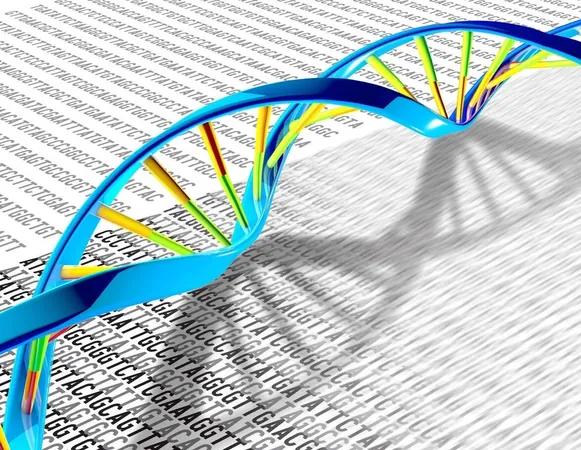
Unlocking Cancer’s Secrets: New Discoveries in DNA Repair Systems
2025-04-09
Author: Yu
The Complexity of Human DNA Repair
Every human cell houses a staggering 3.1 billion DNA building blocks, and safeguarding this genetic treasure is critical. Our cells are constantly busy, untangling DNA knots and forming new chemical bonds to mend breaks in the genetic strands.
A Fresh Perspective on DNA Repair
According to Jacob Corn, a leading Professor of Genome Biology at ETH Zurich, many people mistakenly associate DNA repair solely with damage from toxins or radiation. In reality, these intricate repair mechanisms are vital for everyday cellular survival, helping cells combat various internal and external challenges.
Revealing Interactions Like Never Before
Recent research has spotlighted over 500 genes essential for DNA repair out of the total 20,000 protein-coding genes in humans. By thoroughly analyzing gene interactions, Corn and his team have unearthed valuable insights into how cells uphold their genomic integrity.
A Systematic Approach to Gene Inactivation
The research team took an elaborate approach, modifying human cells to deactivate pairs of repair genes. With an ambitious examination of nearly 150,000 gene combinations, researchers John Fielden and Sebastian Siegner encountered a multitude of complexities in the process.
The Redundancy Challenge
In the realm of gene inactivation, simply disabling one gene often goes unnoticed, as another can easily step in to fulfill its role. "Human cells love redundancy," Corn notes. Only when both backup genes are switched off does the cell start to struggle, accumulating damage that becomes untenable.
Glimpses Into Cancer Therapy
The researchers found critical insights into cellular survival, particularly regarding 5,000 inactivated gene pairs. Their findings point towards promising avenues for cancer treatment. Since cancer cells accrue mutations, some DNA repair genes are already switched off, presenting a unique vulnerability.
New Pathways to Explore
Corn reveals, "We’ve pinpointed additional genes that must be deactivated to thwart cancer cell growth." The team cataloged previously unrecognized connections between common cancer mutations and specific molecular targets ready for drug intervention.
A Tool for Future Research
This groundbreaking work opens up new pathways for therapeutic exploration. Corn's team has also launched a web platform to share their findings—hoping that it becomes an invaluable resource for fellow researchers eager to explore these genetic interactions and accelerate discoveries.
"With this, we’ve lighted up the trails through the dark forest of genetic information," Corn asserts, paving the way for advancements that could revolutionize cancer treatment.

 Brasil (PT)
Brasil (PT)
 Canada (EN)
Canada (EN)
 Chile (ES)
Chile (ES)
 Česko (CS)
Česko (CS)
 대한민국 (KO)
대한민국 (KO)
 España (ES)
España (ES)
 France (FR)
France (FR)
 Hong Kong (EN)
Hong Kong (EN)
 Italia (IT)
Italia (IT)
 日本 (JA)
日本 (JA)
 Magyarország (HU)
Magyarország (HU)
 Norge (NO)
Norge (NO)
 Polska (PL)
Polska (PL)
 Schweiz (DE)
Schweiz (DE)
 Singapore (EN)
Singapore (EN)
 Sverige (SV)
Sverige (SV)
 Suomi (FI)
Suomi (FI)
 Türkiye (TR)
Türkiye (TR)
 الإمارات العربية المتحدة (AR)
الإمارات العربية المتحدة (AR)